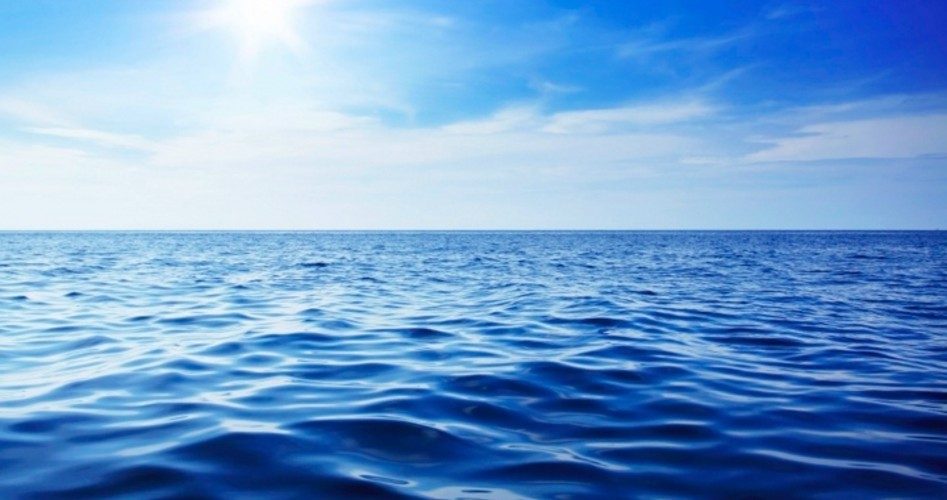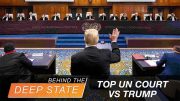
For decades, like the relentless waves of the sea, the politicians, bureaucrats, and activists at the United Nations have been ceaselessly grabbing for control of the Earth’s oceans. Their primary instrument for achieving this has been, and is, the Law of the Sea Treaty (LOST), formally known as the United Nations Convention on the Law of the Sea. Over 160 nations and the European Union have adopted the treaty, with the United States being the sole major holdout.
With little fanfare and almost zero attention from the establishment media, the UN has taken another major step toward ratcheting up the LOST effort to expand international controls over virtually all water on the planet. From March 28 to April 8 the UN, pursuant to General Assembly resolution 69/292, convened a Preparatory Committee (PrepCom) to “develop an international legally binding instrument under the United Nations Convention on the Law of the Sea (UNCLOS) on the conservation and sustainable use of marine biological diversity of areas beyond national jurisdiction.”
This proposed new add-on treaty to LOST would give the UN authority over the biological resources of the high seas, which is to say all plant and animal life in all of the waters that lie outside recognized national coastal waters and economic zones. This would mean control over, literally, more than half the planet. Some of the most influential voices of the Big Green lobby — the most richly funded enviro-activist groups — are calling for these “areas beyond national jurisdiction” (ABNJ) to be turned into international ocean “parks” that would be off-limits to human “exploitation.”
Unfortunately, for humanity and the planet, the Big Green lobby has outsized clout at these international forums, and the UN eagerly welcomes its input as the voice of the people and the planet. When it comes to Law of the Sea Treaty issues, the High Seas Alliance (HSA) is the recognized kingpin. A coalition of 33 organizations, HSA includes such green behemoths as the International Union for the Conservation of Nature (IUCN), the Natural Resources Defense Council (NRDC), the Pew Charitable Trusts, Greenpeace, OceanCare, and the World Wildlife Fund (WWF). Some of these HSA members boast budgets and financial assets that dwarf the national budgets of many of the LOST member states.
At the recent UN PrepCom, the HSA’s legal and scientific “experts” were accorded special status to advise delegates and to make special presentations and distribute their latest studies. This is typical modus operandi for UN events: UN-allied/UN-funded organizations pushing for more power for the UN — what could be more natural!
Although most HSA members list themselves as non-governmental organizations (NGOs), many of them depend on government grants (and/or UN agency grants) for a considerable portion of their revenue. The International Union for the Conservation of Nature (IUCN), one of the largest and most lavishly funded members, cannot even qualify as an NGO, since most of its funding comes from governments (or from UN agencies), and many of its members are governments. On its “Donors & Partners” page, the IUCN’s website informs us:
As the largest professional global conservation network, IUCN has more than 1,200 member organizations, including 200+ government and 900+ non-government organizations, in 160 countries. It is through this vast network of knowledge, action, influence and empowerment that IUCN has become the leading authority on the environment and sustainable development.
According to the IUCN’s own chart of “Contributions by Donor Category,” by far its biggest source of revenue is “governments” (60 percent). Its next largest source (14 percent) is “multilaterals” (IMF, World Bank, UNEP, etc.), while “foundations” (Pew, Ford, Rockefeller, etc.) provide 7 percent. Not surprisingly, the IUCN can always be counted on to faithfully deploy its “vast network of knowledge, action, influence and empowerment” on behalf of further empowering the governments and UN agencies that fill its coffers.
Another of the big guns in the HSA mob is the Natural Resources Defense Council (NRDC). Lisa Speer, director of NRDC’s International Oceans program, has been a leading voice in the Big Green choir for years on all matters concerning LOST. At the recent UN PrepCom, Speer served as a moderator and presenter at programs provided by HSA, NRDC, Greenpeace, WWF, and Pew for UN delegates.
In her NRDC blog, Speer has provided a glimpse of the “world parks system” she and the NRDC/HSA radicals have in mind. “One important international discussion that will be raised at the UN meeting,” Speer said, “is the possibility of creating fully protected marine parks on the high seas, such as those that have been routinely established within national jurisdiction in many countries, such as the United States. The new study confirms that marine reserves, like those we have on land, are one of the best tools we have now for helping ocean species to adapt to a changing ocean. These help protect marine life from harmful human activity, and enhance ecosystem resilience in the face of acidification and warming. For now, fifty percent of the earth lacks a mechanism to create these parks–a huge gap in the world parks system.”
The UN and the NRDC would like to see the UN empowered with the kind of ultra-restrictive regulatory powers the U.S. government claims over those areas it designates as national parks, monuments, habitat reserves, and wilderness areas. This UN park system is necessary, says NRDC’s Speer, to protect the oceans from human activities such as “seabed mining,” “fish farming,” and habitat loss “due to warming waters, mostly from climate change, and ocean acidification caused by carbon emissions.”
Of course, the new add-on biodiversity treaty is merely a more specific claim to power that is already latent in the original LOST text. As the UN’s Division of Ocean Affairs and Law of the Sea (DOALOS) stated at the official celebration of the “25th Anniversary of the United Nations Convention on the Law of the Sea” on October 17, 2007:
The United Nations Convention on the Law of the Sea … is perhaps one of the most significant but less recognized 20th century accomplishments in the arena of international law…. Its scope is vast: it covers all ocean space, with all its uses, including navigation and overflight; all uses of all its resources, living and non-living, on the high seas, on the ocean floor and beneath, on the continental shelf and in the territorial seas; the protection of the marine environment; and basic law and order…. The Convention is widely recognised by the international community as the legal framework within which all activities in the oceans and the seas must be carried out.
We reported on this DOALOS claim in 2009:
Please note that DOALOS, the UN agency in charge of administering LOST, claims the convention covers “all ocean space,” including everything on, in, under, and above the oceans. Note also the heavy use of the adjective “all,” as in “all uses,” “all resources,” “all activities.” But wait; as we shall see, the claims go even far beyond this to include global regulations that will override domestic laws covering not only coastal waters and shorelines, but also human activities in rivers and inland waterways, and land-based activities that may be claimed — no matter how far-fetched — to be harming the marine environment.
Think of LOST as granting the UN the equivalent of the federal EPA’s fantastical “Waters Of The United States” (WOTUS) doctrine, under which the agency now claims jurisdiction over virtually every drop of water in America, according to its bogus “connectivity” theory that masquerades as hydrological science.
“Many Americans have experienced firsthand just how burdensome U.S. regulation of our own waterways, including wetlands regulations, can be,” we reported in 2009. “But how about international regulations of our waterways? What national interest can be served by subjecting ourselves to the regulatory ministrations and taxing authority of UN bureaucrats and judges and the litigational ploys of foreign dictators and anti-American NGOs? Obviously, none. Nonetheless, Senate ratification of LOST is a ‘top priority’ for the new Obama administration.”
In 2009, during her Senate confirmation hearings as President Obama’s Secretary of State, then-Senator Hillary Clinton stated: “The President-Elect and I both supported ratification of the Law of the Sea Convention as senators…. If confirmed, its ratification will be one of my top treaty priorities at State, and the new administration will work with the Senate to secure approval.”
Although she is no longer secretary of state, the U.S. State Department website on LOST still features the following statement by (now-presidential candidate) Clinton at the top of its home page: “The [Law of the Sea] Convention remains an important piece of unfinished treaty business.”
The State Department page goes on to assert: “Joining the Law of the Sea Convention is a top priority for the United States. The Convention, which sets forth a comprehensive legal framework governing uses of the oceans, protects and advances a broad range of U.S. interests, including U.S. national security and economic interests.”
Over the next year, the UN will be holding additional PrepComs, with continued input from the UN-appointed “independent experts” of the HSA/IUCN Big Green cabal. They are expecting to make their major push for ratification in 2018. They are working now to build support for U.S. Senate ratification of both the original Law of the Sea Treaty, as well as the still-incubating ocean biodiversity treaty.
Related articles:
Will Our Freedoms Be LOST at Sea?
EPA Water Police Coming to Your Farm, Business — and Back Yard
The United Nations: On the Brink of Becoming a World Government



